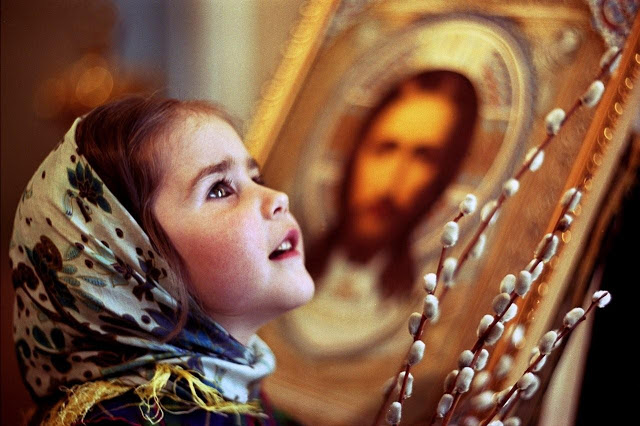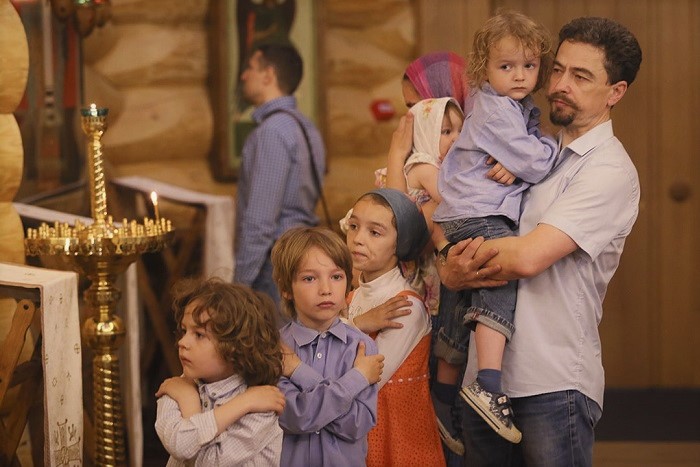
Although the Confessions of adults are sometimes tiresome, the Confessions of children and teenagers are still the most difficult for me.
“I did not obey my parents, I studied poorly, I did not clean my room, I quarreled with my brother, I did not take out the trash, I watched “bad” cartoons…” – this is the most you can hear from a child at the age of 7-12 during Confession. However, with time the content of Confessions remains almost the same. If a child attends church every Sunday, then he has to repeat the same phrases every time he comes to Confession. He will takl about his bad behavior in church; that he did not thank God, that he was inattentive while praying. I would like to say, that with rare exceptions, none of them speaks about their relationships with God.
It is even worse if we speak about the Confession of children of non religious families, in which people do not pray at home and do not read the Holy Gospel. Parents bring them to Confession before the beginning of the school year or, for example, during an excursion at a monastery, for educational purposes (“Father, talk some sense into him!”). Nevertheless, motivation for Confession has nothing to do with the sense of Confession. Usually it is so that neither children, nor their parents understand the essence of this sacrament. The child was told that he should tell the priest about the bad deeds he has committed, so that “God forgives him”. That is it. The sacraments have no connection with real family life. Usually, when these children reach the age of 15, you will not see them in church. Only a few of them will read the Gospel when they get older. But how can we explain to all those relatives that such an approach is unacceptable, because children are not prepared for Confession and the Holy Communion?
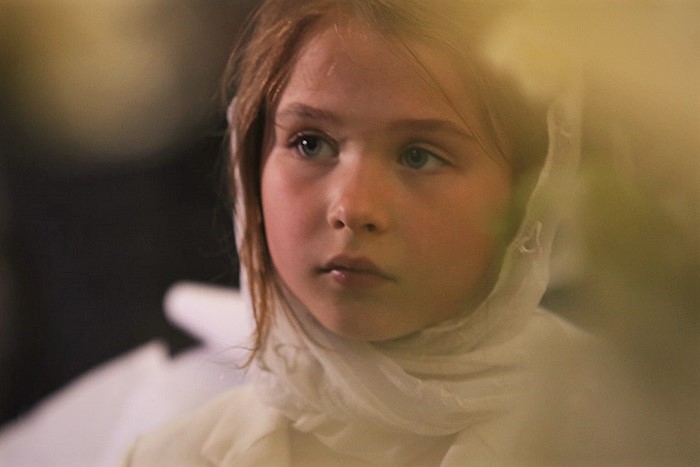
Well, what can we offer concerning the preparation of children for Confession? To answer this question I studied the experience of the well-known spiritual fathers, such as Metropolitan Antony of Sourozh, priests Maxim kozlov, Alexei Uminski, Vladimir Vorobyov and others. On the base of the studied materials, the following general recommendations were prepared:
1. If a family does not have a spiritual father, then the preparation of the children rests on the parents’ shoulders. First of all it demands a personal example, when the parents attend church and take part in the sacraments at least from time to time, and the child can see them praying, fasting and reading the Holy Gospel and other spiritual literature. However, if the parents understand that they do not have enough experience for this, then the godparents can assist them.
2. While preparing for Confession,it is important to let the child feel old enough to estimate his deeds on his own. The conversation should not take the form of a lesson, which the child must remember. He can repent only in those deeds, which he understand as bad ones on his own.
3. It is unacceptable to tell children that God will punish them.If the child sees God as an attorney, it will lead to misconstruction of his religious experience. As we say the God is the Father, then it is natural that the image of God is formed according to his personal relationships with his parents. If the relationships are harmonious, if they are based on love, respect and trust, then it will be much easier to explain the child that the sin is not just a crime, but something that ruins this love and trust and creates an obstacle between the man and God. Just as it is natural for a child to love his parents, it is the same natural to learn how to love God.
4. Preparing children for Confessionadditionally fosters parents, godparents and other relatives to work on themselves. One of the reasons why children leave the Church when they get older is that they have been overwhelmed with prayer and sacraments, but at the same time they do not see that their parents have personal relationships with God. It can be the case when their life comes down to fulfilling certain formal rules (fasting, reading of various spiritual literature), but there is no joy of the life in Christ. Moreover, it can happen in case the parents do not work on themselves and do not think of their sins, or in case there are no healthy and harmonious relationships.
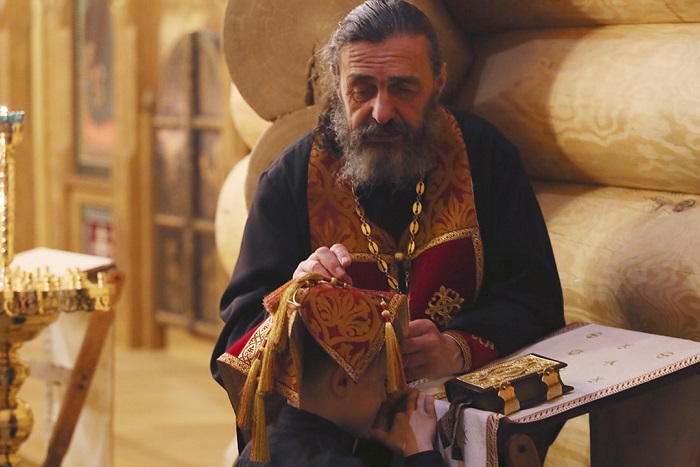
5. Since children’s imagination is much stronger than their logics, it is better to deliver information about sins and their types using different images, examples and proverbs. To do this you can compile the material about passions and then discuss it with your child within several days. Thus, he will manage to understand whether this or that sin concerns him personally or not. No way you should point to the evident child’s sins. To simplify the process of self-development, you can offer your child to note certain sins he might like to confess.
6. While preparing for Confession it is importantnot only to help the child to recognize his sins, but to foster him to gain the virtues, without which we cannot live spiritually. These virtues are attention to our inner condition and the skill of prayer. It is possible for children to see the Lord as their Heavenly parent, and this is why is it quite easy to explain to them that prayer is a kind of conversation between them and God. Children need communication with their parents as well as spiritual communion with God.
7. Children should not read any long prayers.Children should be able to handle the prayer. Excerpts from the prayer in his own words, such prayers as the “Song to the Most Holy Theotokos” and “The Lord’s Prayer” would be enough for a child.
8. The Holy Communion and Confession are two completely different sacraments.The way they combine in a person’s life depends on the features of each person. Fr. Alexi Uminski says, “A child should not confess every time he is going to partake of the Holy Communion… Unfortunatelly, much depends on the personal approach of the priest. For example, there are priests who do not let children to partake of the Holy Communion if they have not confessed before. They do not care of the children’s age – whether they are 6, 7, or 15 years old.
9. It is advisable that the child managesto establish personal relationships of trust with the priest. To do this they need communication, which can be provided by the Sunday School and various common activities such as camping trips and pilgrimages.
10. There is no need to begin to confess at the age of 7. As Fr. Maxim Kozlov mentions, “Today children grow up physically much faster than spiritually and psychologically. This is why it happens so that most of them are not ready to confess when they are just 7 years old. Is it not time for us to say that the age of Confession should be set up individually in each case? At the age of 7 they can see the difference between the good deed and the bad one, but we cannot say that this is something we can call repentance. Their moral conscience awakes much later. But let it be so. Let them come at 9 or 10, when they become more responsible for their lives and deeds… The formalization of children’s Confession which takes place today is quite dangerous thing”.
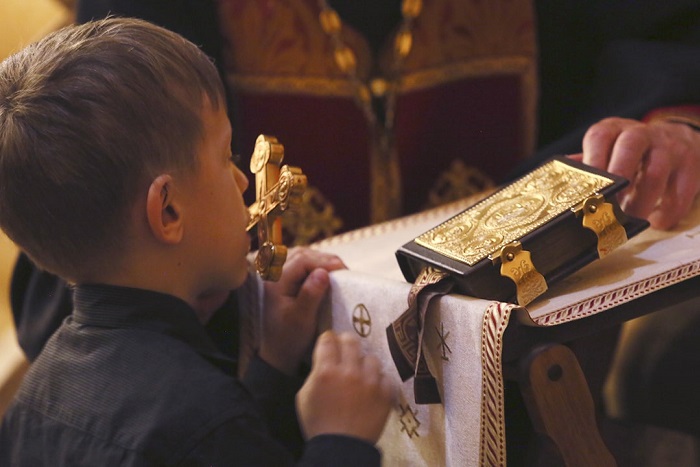
11. It would be preferable to agree on a time of the first Confession with the priest beforehand.The first Confession requires special attention. This is why it is important not to put it off or plan it on a feast day or when the priest may be busier than usual.
12. A child’s preparation for Confession begins from the time of his or her self-awareness begins.Children may be ready for their own personal religious experience such as personal prayer by the age of three. And be able to say “sorry” to parents, friends, siblings right away without waiting for Confession. Once again it is important for the child to see an example from his parents and older brothers and sisters.
13. Never use Confession as a disciplinary method.Such a pragmatic method instantly reveals the “spirituality” of those who “send” their children to confession. According to C. S. Lewis: “Men or nations who think they can revive the Faith in order to make a good society might just as well think they can use the stairs of Heaven as a short cut to the nearest chemist’s shop.” The temptation to use Christianity for the development of patriotic feeling of “obedience” toward parents is quite high.
14. If children go to communion often, they should not go to Confession every week.This would become more of a formality. Children can very quickly learn how to say a certain “standard”: disobeyed my mother, sad bad things at school had a fight with his brother. Practically not a single child will say that he prayed and was not sincere about it, that he has some inner worries or uncertainties. And after a few years such a “pious Christian” will not have the slightest idea on what repentance means. Confession will no longer lead to the desire to repent. As Father Maksim Kozlov had noted: “it is a good idea after conferring with the spiritual father to confess the little sinner for the first time at the age of 7, for the second time at the age of 8 and for the third time at the age of 9 in order to prolong the beginning of confessing often, regularly, and to make sure that it will not become a simple habit.”

15. As Children grow up, it is important to let them know that Communion is the Blood and Body of Christ that is the Holy of Holies, which one cannot approach just like that. It is important not make communion onto a casual weekly event especially when they play around and run around without even having a thought regarding what they are doing. And if you see that your child is misbehaving before the service and continues to misbehave in church during the service – it is better not to lake him to the Chalice. It would be better for him to understand that one cannot approach communion in any state. And perhaps it is better for the child to commune not as often as you would like but rather to understand why he is coming to church. It is important that the parents do not approach communion of a child as a sort of magic where they shift the responsibility, which they should be responsible for, upon God.
16. It is pedagogically correct if you manage to let your children understand that attending the service and the Holy Communion is not just an obligation, but a privilege– a privilege to be adopted by the Heavenly Father through the Blood and Body of the Son. There is no galaxy which could hold God. But the human’s heart can. However, it should be prepared to accept Him, and for this we need to work on ourselves. We need to try and organize our family attitude to Divine services in such a way that we do not bring our children to the chalice, but that they want to come themselves. Nevertheless, parents should not make their children come there if they have reached their age of reason already; parents can only offer them to come.
17. It is not recommended to have young children attend the entire service. It is difficult even for adults to keep their prayerful condition during the two-hour-long service. Neither can children, which is absolutely natural. As a result, they begin to behave irreverentially: they run across the church, scream and grizzle. Thus they lose the feeling of something sacred. Such children often lose their faith in the future as well. They do not know what adoration is. This is why it is better to limit the amount of the services and the time spent there. It will be enough to stay for 20 minutes in the evening and then come next morning 20 minutes before Communion if the child is under the age of 5. Then you can increase the amount of time spent in church with each year. Even if the mother wants to stay for the whole service, it is better to sacrifice her desire for her child. In practice there is also another variant: a parent comes to the service “for himself”, while the second parent comes with the child later, when the Communion is about to begin. What is more, in some parishes even special liturgies for children are held. Anyway, children’s ability to stay calm in the church depends a lot on how are thing with family prayer at home.

18. Do not forget that the process of churching is prevented by a non-Christian atmosphere in school, TV and internet.Your child’s peers look at their life differently. Their friends will not always share the same interests.
To protect the child from the influence of the secular world we have to develop his positive criticism and the desire for inner freedom. According to Fr. Vitaly Sinkar, “Parents’ goal is not to prepare children for Confession, but to show them the depth of life, to teach them how to understand it. Teach them to love books and to understand poetry. We need to talk to them: about life and its content, about this world. We should not separate them from the world because everything is “demonic”, instead we need to provide them with their own spiritual shield. And of course we need to pray for them: to not only speak with them about God, but to speak with God about them as well.
19. Concerning fasting, we should take into account the peculiarities of children’s psychological and physical condition.At first, parents themselves make some food restrictions. But their goal should be that their child begins to restrict himself on his own with time. Even if he just refuses from ice cream or crisps, it will become a great step in his personal spiritual development. Let us point out gain that the degree of preparedness depends on parents a lot. It is important that fast does not come down to simple disciplinary rules.
20. It is a great idea to celebrate the first Confession and Communion, so that these events become a true feast for your children. On this day you and your child can even dress up. It will be nice if you decide to have a simple festive dinner or to go to a café.
Remember that when taking part in the social, spiritual and psychological development of our children we should not make them meet our own expectations no matter how much we want this. Our task is to prepare them for their future life. To teach how to establish their personal relationship with God.

